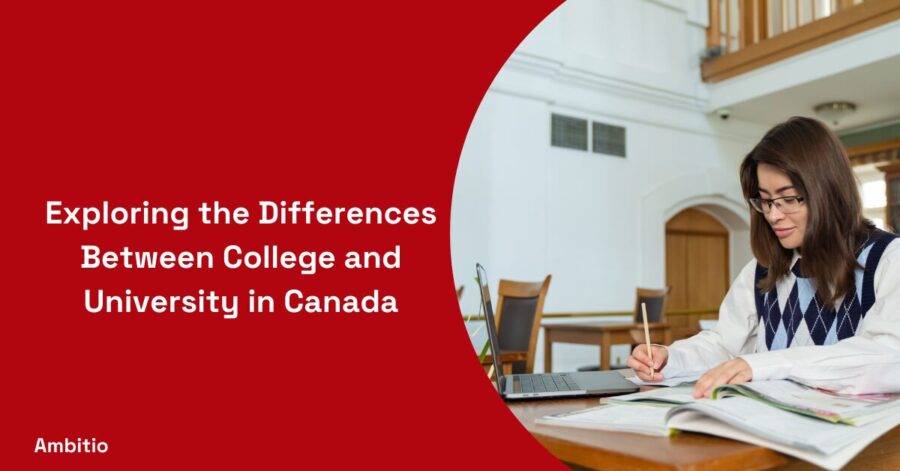11 December 2024
6 minutes read
Exploring the Differences Between College and University in Canada: A Guide for Prospective Students

Introduction
Canada’s education landscape offers a myriad of opportunities, but understanding the difference between college and university is crucial for students planning their academic futures.
This comprehensive guide will explore various aspects of Canadian colleges and universities, aiding you in making an informed decision.
The Distinctive Paths of College and University Education in Canada
Canada boasts a diverse education system, with each type of institution catering to different academic needs and career goals.
Academic Focus and Curriculum Structure
University Education: A Journey Through Academic Excellence
Canadian universities, renowned for their academic rigor, offer a broad spectrum of undergraduate and graduate programs. These institutions emphasize theoretical knowledge, critical thinking, and research skills.
Universities like McGill and the University of British Columbia attract students globally, offering diverse fields of study from humanities to advanced sciences. An undergraduate degree typically spans four years, while postgraduate and doctoral studies vary in duration based on the field and research scope.
These institutions also boast a rich campus life, encouraging students to engage in various extracurricular activities, fostering a holistic educational experience.
The academic culture in universities promotes intellectual growth and prepares students for careers in research, academia, and professional sectors requiring high-level qualifications.
College Education: Tailoring Skills for the Job Market
In contrast, colleges in Canada offer more streamlined programs focusing on practical skills and job readiness. Programs like diplomas, certificates, and applied degrees are designed to prepare students for specific career paths, such as technology, trades, or healthcare.
Colleges like Humber College and Algonquin College offer programs ranging from one to three years, integrating hands-on training with classroom learning.
Colleges are also known for their smaller class sizes, allowing for more personalized instruction and a focused learning environment. This approach is beneficial for students seeking to enter the workforce quickly with relevant skills and practical experience.
Research Opportunities and Industry Connections
Research and Innovation at Canadian Universities
Research is a cornerstone of Canadian university education. Institutions like the University of Waterloo and the University of Toronto are at the forefront of global research, contributing significantly to fields like artificial intelligence, health sciences, and environmental studies.
Students at these universities have the unique opportunity to participate in cutting-edge research projects, often in collaboration with industry partners. This exposure not only enhances their academic experience but also provides a platform for innovation and real-world problem-solving.
Graduate students, in particular, are encouraged to engage in research, often leading to groundbreaking discoveries and contributions to their fields of study.
Industry-Aligned Training in Canadian Colleges
Colleges in Canada excel in offering programs that align closely with industry needs. Colleges maintain strong partnerships with local businesses and industries, ensuring their programs are tailored to current job market demands.
Programs in fields like digital media, culinary arts, and engineering technology are designed with input from industry professionals, guaranteeing that students acquire relevant, up-to-date skills.
Many college programs include co-op or internship components, allowing students to gain valuable work experience and network within their chosen industries. This practical approach not only enhances employability but also provides students with a clear understanding of their field before graduation.
International Perspective: Canada as a Global Education Hub
Welcoming International Students in Canadian Universities
Canadian universities are globally recognized, attracting a large number of international students each year. Institutions like the University of Toronto and McGill University offer a multicultural environment, providing a global perspective to education. International students are drawn to the high-quality education, research opportunities, and the welcoming nature of Canadian society.
These universities also offer a range of support services for international students, including language assistance, cultural integration programs, and career counseling. This inclusive environment not only enriches the learning experience but also prepares students to thrive in a globalized world.
Practical Training for Global Careers at Canadian Colleges
Colleges in Canada are also popular among international students for their career-focused programs. Offering practical training and shorter duration courses, colleges provide an efficient path to gaining skills relevant in the global job market. Programs in business, technology, and healthcare are particularly popular, reflecting the demand in international job markets.
Colleges also offer support services tailored for international students, assisting with cultural adjustment, language skills, and job placement. This focus on practical skills and industry relevance makes Canadian college graduates highly employable both in Canada and abroad.
Financial Considerations: Tuition and Scholarships
Navigating Tuition and Funding in Universities
Understanding the financial aspect of university education in Canada is crucial for prospective students. Here are key points to consider when navigating tuition and funding:
- Varied Tuition Costs: University tuition fees in Canada vary based on the institution, program, and whether you’re a domestic or international student. Typically, humanities and social sciences programs have lower tuition fees, while programs like engineering and medicine are more expensive.
- Higher Costs for International Students: International students generally pay higher tuition fees compared to domestic students. This is due to the lack of government subsidies for international students’ education.
- Scholarships and Bursaries: Many Canadian universities offer a range of scholarships and bursaries to help students fund their education. These can be based on academic excellence, financial need, community involvement, or specific talents.
- Research and Teaching Assistantships: Graduate students often have the opportunity to work as research or teaching assistants. These positions not only provide valuable experience but also offer stipends or tuition waivers.
- Government Student Loans and Grants: The Canadian government provides student loans and grants to eligible students. These loans are interest-free while you are in school and have flexible repayment plans.
- Work-Study Programs: Universities often offer work-study programs, allowing students to work part-time on campus in positions related to their field of study. This provides income as well as valuable work experience.
- External Funding Sources: Students can also explore external funding options like private scholarships, community awards, or funding from non-profit organizations.
- Payment Plans: Many universities offer flexible payment plans, allowing students to pay their tuition in installments rather than a lump sum, easing the financial burden.
- Financial Counseling Services: Most universities provide financial counseling services to help students plan their budget, understand their funding options, and manage their finances effectively during their studies.
- Cost of Living Considerations: Beyond tuition, students should also consider the cost of living, including accommodation, food, transportation, and textbooks. Some universities offer financial assistance for these expenses as well.
Affordable Education Paths in Colleges
Colleges in Canada are known for their more affordable tuition fees, making them an attractive option for students looking to minimize debt. The focused nature of college programs means students can complete their education faster, further reducing the overall cost.
Financial aid options, including scholarships and bursaries, are also available at colleges, though they may be more limited compared to universities. For students concerned about the financial aspect of their education, colleges offer a viable and cost-effective path to obtaining a quality education and entering the workforce.
Flexibility and Accessibility: Online and Part-Time Options
Embracing Online Education in Universities
The rise of online education has transformed the landscape of university learning in Canada. Institutions like Athabasca University offer a range of online undergraduate and graduate programs, providing flexibility for students who cannot attend on-campus classes. This mode of learning is particularly beneficial for working professionals, parents, or those living in remote areas.
Online programs at universities maintain the same rigorous standards as their on-campus counterparts, ensuring that students receive a quality education regardless of their location. This flexibility has made university education more accessible and inclusive.
Part-Time and Continuing Education in Colleges
Colleges in Canada excel in offering part-time and continuing education options, catering to a diverse range of learners. These programs are designed for individuals looking to upgrade their skills, change careers, or balance education with other responsibilities. Colleges offer evening, weekend, and online classes, providing greater accessibility for non-traditional students.
Part-time programs in colleges are career-focused, offering the latest industry-relevant skills and knowledge. This flexibility allows students to advance their careers without having to commit to full-time study.
Conclusion
Choosing between a college and a university in Canada depends on your career goals, learning style, and financial considerations. Both paths offer unique advantages and opportunities, shaping students into skilled professionals ready to excel in their chosen fields.
By understanding the differences and similarities between these two educational paths, students can make informed decisions that align with their aspirations and lead to fulfilling careers.
FAQs
Q1: Can I transfer from a college to a university in Canada?
Yes, many colleges in Canada have agreements with universities that allow students to transfer credits and continue their education.
Q2: Do Canadian colleges offer degree programs?
Some colleges in Canada offer degree programs, often in technical or applied fields, but they are more known for diplomas and certificates.
Q3: Are university degrees more recognized than college diplomas in Canada?
Both are recognized and respected, but they serve different purposes. University degrees are often required for research and academic careers, while college diplomas are valued in technical and skilled trades.
Q4: How long does it typically take to complete a college program in Canada?
College programs in Canada typically range from 1 to 3 years, depending on the type of program (diploma, certificate, or degree).
Q5: Are there co-op programs available at Canadian universities?
Yes, many universities in Canada offer co-op programs, combining academic studies with work experience in relevant industries.

You can study at top universities worldwide!
Get expert tips and tricks to get into top universities with a free expert session.
Book Your Free 30-Minute Session Now! Book a call now




























